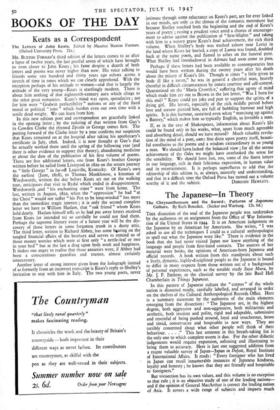BOOKS OF THE DAY
Keats as a Correspondent
The Letters of John Keats. Edited by Maurice *Buxton Forman. (Oxford University Press. 21s.) MR. BUXTON FORMAN'S third edition of the letters comes to us after a lapse of twelve years, the last painful seven of which have brought us even closer to John Keats ; his fame despite a dearth of both letters and poems was never higher than now. His voice talking to friends some one hundred and thirty years ago echoes across a stretch of time in tones which we can clearly apprehend. With the exception perhaps of his attitude to women—and that is largely the attitude of the very young—Keats is startlingly modern. There is about him nothing of that eighteenth-century aura which clings to the other great romantics. Keats's mind was open, speculative ; not for him were " Godwin perfectibility " notions or any of the fixed moral or political " isms " which burden even our own time with a senile dead weight. We can learn from MM.
In this new edition poet and correspondent are gracefully linked in the opening letter ; by the redating of that written from Guy's to Cowden Clarke the rhymed Epistle to George comes first. The putting forward of the Clarke letter by a year confirms our suspicion that Keats remained on at the hospital after taking his apothecary's certificate in July, 180. Indeed, it is now thought at Guy's that he actually worked there until the spring of the following year (and there is other evidence to support this theory), abandoning medicine at about the date of the publication of his first volume of poems. There are five additional letters, one from Keats's brother George written before he sailed from Liverpool in 182o on the return journey to " little George ", in far-off Louiville, Kentucky. Of Keats's own the earliest (June, 18x8), to Thomas Monkhouse, a kinsman of Wordsworth, written the day before Keats set out oil the walking tour, anticipates that visit to Rydal which ended in disappointment. Wordsworth and " his enchanting sister " were from home. The last, written in August, 182o, when the " oppression " -he had "at the Chest " would not suffer " his Pen to be long-winded " has more than the immediate tragic interest ; it is only the second complete letter we have to William Haslam, that "oak friend" whom Keats held dearly. Haslam himself tells us he had put away letters received from Keats (or intended to) so carefully he could not find them. Perhaps the supreme literary event of a future year will be the dis-
covery of those letters in some forgotten trunk in a dusty attic. The third letter, written to Richard Abbey, has some bearing on the tangled financial affairs of the brothers and serves to remind us of those money worries which were at first only " a nettle-leaf or two in your bed " but at the last a drag upon both work and happiness.
It makes one angry to realise that those anxieties were, if Abbey had been a conscientious guardian and trustee, almost certainly unnecessary.
Another letter of strong interest given from the holograph instead of as formerly from an incorrect transcript is Keats's reply to Shelley's invitation to stay with him in Italy. The two young poets, never
intimate through some reluctance on Keats's part, are for ever linked in our minds, not only es the climax of the romantic movement but because Shelley touched both the beginning and the end of Keats's years of poetry ; raising a prudent voice amid a chorus of encourage- ment to advise against the publication of " first-blights " and taking with him to a watery grave Keats's final achievement, the rich third volume. When Shelley's body was washed ashore near Lerici in the land where Keats lay buried, a copy of Lamia was found, doubled back at the name poem, and flamed to ashes on the funeral pyre. What Shelley had foreshadowed in Adonais had soon conic to pass.
Perhaps if these letters had been available to contemporaries less would have been written during the twenty years after his death about the misery of Keats's life. Though at times " a little given to bode ill like a raven," he was in general a cheerful man, bravely cheerful in difficult circumstances by innate courtesy and self-control. Quarantined on the ' Maria Crowther,' suffering that agony of mind which made him cry out to Brown in the last letter, " Was I born for this end? " Keats could yet joke and pun to support the spirits of a dying girl. His letters, especially of the rich middle period before love and sorrow pierced him, are full of bubbling hnmour and high spirits. It is this humour, sustained even when "marching up against a Battery," which makes him so typically English, so loveable a man.
If, as in the case of Shakespeare, information about Keats's life could be found only in his works, what, apart from much agreeable and absorbing detail, should we have missed? Much valuable revela- tion of the mind of a poet, some fine dicta upon poetry itself, beauti- ful corollaries to the poems and a wisdom extraordinary in so young a man. We should haveilacked the balanced view ; for all the serene achievement of the Odes we might have overlooked the sense for the sensibility. We should have lost, too, some of the finest letters in our language, rich in their felicitous expression, in human value and in entertainment. It is perhaps superfluous to add that the editorship of this edition is, as always, masterly and understanding, and that in a difficult time the Oxford Press has turned out a volume


































 Previous page
Previous page